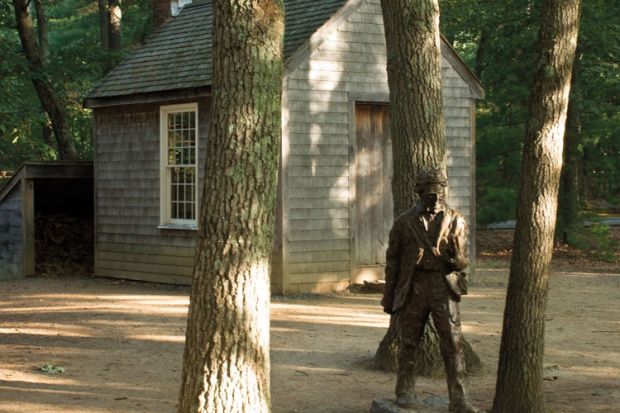Source: Alamy
Where the art is: Thoreau’s meditations inspired him as a student, says academic
An American journal has set out to define “what humanists do” by asking leading academics to reflect on the texts that “inspired and continue to inspire the work [you] do”.
Denis Donoghue, Henry James professor of English and American letters at New York University, says in his guest editor’s introduction to the winter 2014 issue of Daedalus: Journal of the American Academy of Arts & Sciences that it offered a chance to restate the value of the humanities.
“When I was a young teacher of English in Dublin,” he writes, “this question never arose…it was taken for granted that it was a worthy thing to spend one’s life reading literature and teaching it to large classes of undergraduates”.
“Only recently,” he continues, “has the teaching of literature ceased to be a self-evident good…Reasons must be given. In our time, the only accredited value is that something leads to something else. We are obliged to show not only cause but consequence. The humanities are vulnerable because they do not lead to anything: they do not cure a disease or build a bomb.”
In response, Professor Donoghue offers two possible answers. The first is that humanists “do their pupils good”, “train their students to be more alive, more intelligent, more critical than they would otherwise be”, perhaps even “more sensitive to the lies they hear on TV”.
The second imagines the student experience as “an oasis, time-out, years in which to learn new skills, enjoy the experience of being at a distance from the other world…a liberal education seeks knowledge for its own sake; that is, independent of any sequel”.
To further illustrate “what humanists do” and what they ought to do, Professor Donoghue invited 12 distinguished scholars to address the question: “What text would you want passed on to the next generation of scholars and why?”
Among the contributors is Scott Russell Sanders, distinguished emeritus professor of English at Indiana University. He recalls how he first read Henry David Thoreau’s Walden “the summer before starting college, at the urging of a high school teacher who sensed that my adolescent mind, brimming with questions, would benefit from grappling with a truly radical thinker”.
“Whether or not [it] speaks to your condition, I tell my students, there are other books that will do so, giving voice to what you have felt but not been able to say, asking your deepest questions, stirring you to more intense life.”
Among the other writers chosen by participants in the journal’s project are Baudelaire, Beckett, Tennyson, Virgil and Virginia Woolf.
Register to continue
Why register?
- Registration is free and only takes a moment
- Once registered, you can read 3 articles a month
- Sign up for our newsletter
Subscribe
Or subscribe for unlimited access to:
- Unlimited access to news, views, insights & reviews
- Digital editions
- Digital access to THE’s university and college rankings analysis
Already registered or a current subscriber? Login





